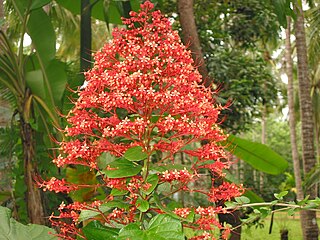
Syzygium paniculatum, the magenta lilly pilly or magenta cherry, is a species of flowering plant in the myrtle family Myrtaceae, native to New South Wales, Australia. A broad dense bushy rainforest tree, in cultivation it grows to a height of 15 m (49 ft) with a trunk diameter up to 35 cm (14 in). The largest known example is at Ourimbah Creek, 35 m (115 ft) metres tall. The leaves are 3–9 cm (1.2–3.5 in) long, opposite, simple and slightly obovate, tapering at the leaf base. They are dark glossy green above, and paler below. White flowers are produced in clusters. The edible fruit is usually magenta, but can be white, pink or purple. The seeds are polyembryonic.

Talinum paniculatum is a succulent subshrub in the family Talinaceae that is native to much of North and South America, and the Caribbean countries. It is commonly known as fameflower, Jewels-of-Opar, or pink baby's-breath.

Vandopsis, abbreviated as Vdps in horticultural trade, is a genus of orchids in the family Orchidaceae. It contains ca. 5 species found in Southeast Asia, Southern China, the Philippines, and New Guinea. Recently Vandopsis undulata was excluded, as the genus would otherwise be paraphyletic. The species was transferred to the genus Cymbilabia.

Cleisostoma is a genus of orchids with approximately 90 accepted species widely distributed through much of the Indian Subcontinent, Southeast Asia, China, New Guinea, and some of the islands of the Western Pacific.

Solanum paniculatum, commonly known as jurubeba, is a nightshade common in almost all of Brazil. It is used as a medicinal plant and has a bitter taste.

Cleisostoma rostratum is a species of orchid found in Cambodia, Laos, Thailand, Vietnam and China.

Cleisostoma simondii is a flowering plant that grows upon larger trees, and known in Hong Kong as (Chinese:蜘蛛蘭). It also occurs in the Himalayas, Cambodia, Laos, Myanmar, Thailand, Vietnam, and other parts of China.
Schistotylus purpuratus, commonly known as purple sprites, is the only species in the genus Schistotylus from the orchid family, Orchidaceae. It is a small epiphytic orchid with up to six crowded, linear leaves and up to ten cup-shaped, pale green flowers with purple marking and a mostly white labellum. It grows in rainforest and swampy heath in eastern Australia.

Toxicoscordion paniculatum is a species of flowering plant known by the common names foothill deathcamas, panicled death-camas, and sand-corn. It is widely distributed across much of the western United States, especially in the mountains and deserts of the Great Basin region west of the Rocky Mountains. It grows in many types of habitat, including sagebrush plateau, grasslands, forests, and woodlands, etc.

Combretum paniculatum, the burning bush or forest flame-creeper, is a plant species in the genus Combretum found in Africa. The fruit is a samara, i.e. a winged seed.
C. paniculatum may refer to:

Van herbed cheese is a type of cheese made out of sheep's or cow's milk. Ripened cheese varieties containing herbs are traditional in Turkey and have been manufactured for more than 200 years in the east and southeast of the country. They are manufactured from raw milk, semi-hard in texture and salty in taste and have the aroma of garlic or thyme due to added herbs. Twenty-five types of herb, including Allium, Thymus, Silene and Ferula species which are most popular, are used individually or as appropriate mixtures. The most popular of these cheeses is Otlu which is produced mainly in the Van Province of Turkey in small dairies and villages, but now is produced in other cities of the eastern region of Turkey and its popularity increases continuously throughout Turkey.
Sarcosperma paniculatum is a tree in the family Sapotaceae. The specific epithet paniculatum means "loosely branched", referring to the flowers.

Clerodendrum paniculatum, the pagoda flower, is a species of flowering plant in the genus Clerodendrum and family Lamiaceae. It is native to tropical Asia and Papuasia, Fiji, and French Polynesia. It is introduced in Central America.

Allium paniculatum, common name pale garlic, is a species of monocot in the family Amaryllidaceae. It is widely cultivated and is now naturalized in several places outside its native range.

Hieracium paniculatum, the Allegheny hawkweed, is a North American plant species in the tribe Cichorieae within the family Asteraceae. It grows only in the eastern United States and eastern Canada, from Nova Scotia west to Ontario, Michigan, and Indiana south as far as Georgia.
Cleisostoma williamsoni is a species of orchid. It is found in Asia.

Cleisostoma aspersum is a species of orchid found in Bhutan, India, Myanmar, Thailand and Vietnam.

Cleisostoma crochetii is a species of orchid found in Vietnam, Cambodia and Laos.

Cleisostoma sagittatum is a species of orchid found in Borneo, Java, the Philippines and Sumatra. This species was first described by Blume in 1825.
















